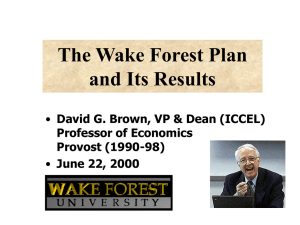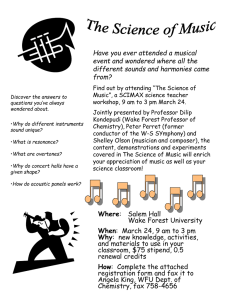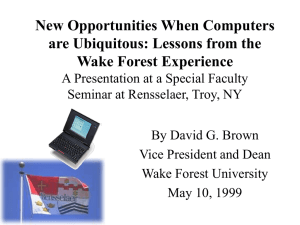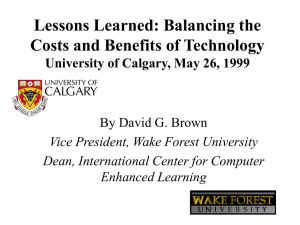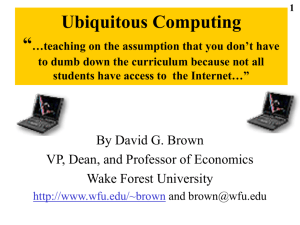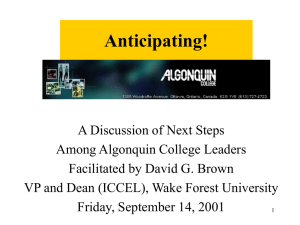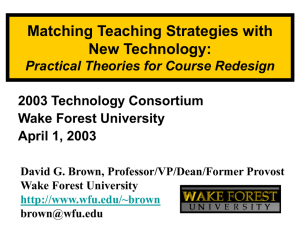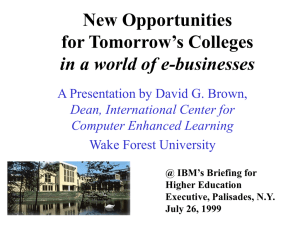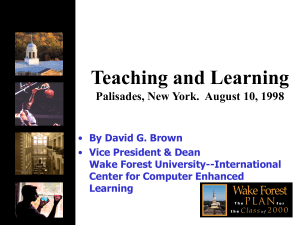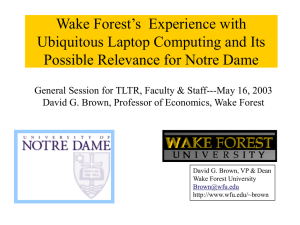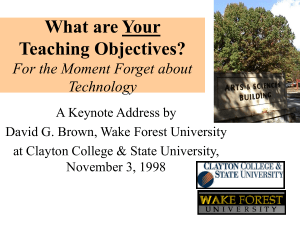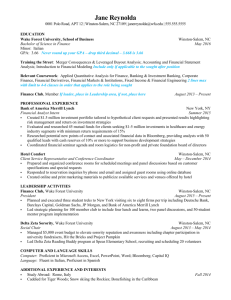New Opportunities for Teaching and Learning in a wired world
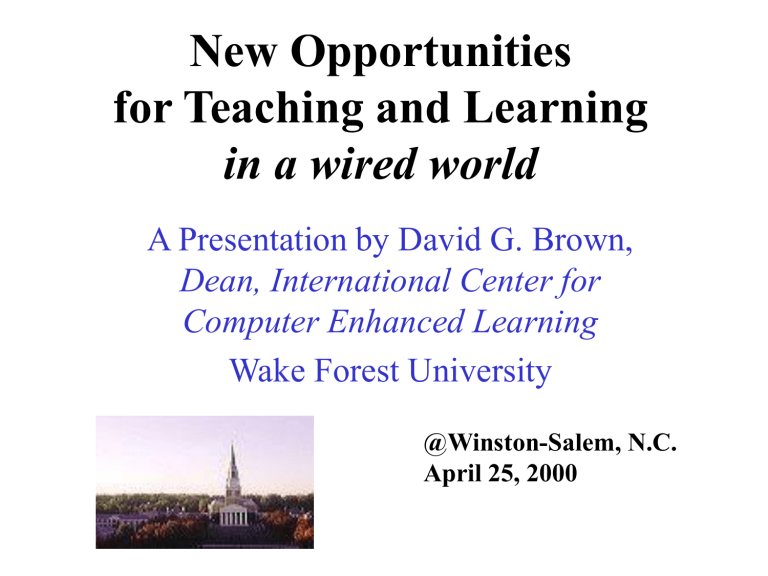
New Opportunities for Teaching and Learning in a wired world
A Presentation by David G. Brown,
Dean, International Center for
Computer Enhanced Learning
Wake Forest University
@Winston-Salem, N.C.
April 25, 2000
New Day:
Times of Rapid Change
• Universal Access to the Network
• From Access to Filtering a Flood of Info
• Geographic barriers gone
• Asynchronous Interaction
• Multimedia Learners
New Day
Big Changes for Higher Education
Democratization of
Access (Ubiquity)
Democratization of
Usage (Course Shells)
Heyday Because---
Universities Survive Change
• 67 of the 74 oldest organizations!
• Distribute authority
• Tolerate Kooks
• House young people with fresh ideas
• House bright people with diverse views
• Employ knowledge fountains
The economist in me says that doing business in an info-rich society will be different
• Better informed buyers (web browsing)
• Better informed sellers (metadata)
• More data-based decisions
• Faster cycle times
• Less geographic loyalty
• More interactive transactions
• More customization
• More specialization (& outsourcing)
THE
WAKE FOREST
PLAN
•
Plan for 2000
• Thinkpads for all
• Printers for all
• New Every 2 Years
• Own @ Graduation
• Wire Everything
• Standard Software
•
Full Admin Systems
• IGN for Faculty
Fresh/Junior Computer
F99: IBM390, 128RAM
333Mhz, 6GB, CD-ROM,
56 modem, Netscape4.5,
MapleV5.1, Windows98
Dreamweaver 2, SPSS9,
MS Office Professional97
• 40+30 New People
•
75% Faculty Trained
• 85% CEI Users
• 98% E-Mail
• +15% Tuition
• ~$1500/Yr/Student
• 4 Year Phase In
• Pilot Year, Now 4 Classes
CONCEPTS BEHIND PLAN
• Students First
• 2 Layers: Threshold +
• Rapid Change
• Communicate/Access (Not
Present/Analyze)
• Standardization
• Academic Freedom
• Nomadic Learners
CONCEPTS BEHIND PLAN
• Dominant Use After College
• Empower Existing Units
•
Eager Faculty
• Students Change Agent
• Exposure, Not Mandate
• Partnership
• Marketable Difference
Computers Enhance My
Teaching and/or Learning Via--
Presentations
Better--20%
More Opportunities to
Practice & Analyze--35%
More Access to Source
Materials via Internet--43%
More Communication with Faculty Colleagues, Classmates, and Between Faculty and Students--87%
Computers allow people----
• to belong to more communities
• to be more actively engaged in each community
• with more people
• over more miles
• for more months and years
• TO BE MORE COLLABORATIVE
ICCEL -- Wake Forest University, 1999
With Ubiquity---
The Culture Changes
•
Mentality shifts -like from public phone to personal phone.
•
Teaching Assumptions shift -like from readings are on reserve to everyone owns a copy of his/her own.
•
Timelines shift -like from “our class meets MWF” to “we see each other all the time and MWF we meet together
”
• Students’ sense of access shifts
-like from “I can get that book in the library” to “I have that book in my library.”
•
Relationships shift -like from a family living in many different states to all family members living in the same town
Examples from My Own Class
•1247 e-mails
•Cybershow
•One Minute Paper
•Computer Tip Talk
•Joint Editing
Beliefs of 91/93 Vignette Authors
Pedagogy and Philosophy
• Interactive Learning
• Learn by Doing
• Collaborative Learning
• Integration of Theory and Practice
• Communication
• Visualization
• Different Strokes for Different Folks
Wake Forest University, 2000
The educator in me says that doing business in an info-rich society will be different
• More Communication
• More Community Loyalty
• More Collaboration
• More Customization
• More Interactivity
The teacher in me says that there are new tools and new opportunities
•
Collaboration & Extension
•
Continuous Communication
•
Controversy and Debate
• Repetition
• Alternate Materials
The New Education
Environment
•
Many Tightknit Communities. Student
Affinity and Bargaining Groups
•
Interactivity Expected. Between students and professors and among students
•
Information Filters Everywhere.
Challenge is gaining and maintaining attention
•
Worldwide Specialization. Geography less relevant.
What’s My Role in the New
World of e-Communication?
Primary : Linking trusting clients with the best educational resources and motivating them to use them. Consolidator!
Secondary : Creating educational resources for other “consolidators” to buy
Tertiary : Selling auxiliary services such as meals, overnights, t-shirts, mailing lists
Therefore, I should---
• Focus on my comparative advantages
• Strengthen ties with my natural constituencies
• Partner with organizations that can provide outsourcers who understand my infrastructure
• Build a reliable infrastructure
• Enable my “team” to be interactive 7x24
Specific Actions to be Taken
• Empower faculty with equipment, training, and support (democratize)
• Partner with outsourcers like IBM
• Adopt “infrastructure” usable by my students
• Use fast-loading webpages that fit all screens
• KISS (both faculty and students)
• Collect and use Metadata
More Specific Actions--
• Create & Join Community Networks
• Act on the 80/20 and 20/80 assumption
• Customize service to natural constituency
• Nurture My Clusters of Learners
• Offer e-mail forwarding for life
• Build monitored LISTSERVS-- especially before enrollment and after graduation
• Presume that all information will be shared
Basic Themes
• Communication
• Customization
• Collaboration
• Community
• Interactivity
• Know What Business You’re in
David G. Brown
Wake Forest University
Winston-Salem, N.C. 27109
336-758-4878 email: brown@wfu.edu
http//:www.wfu.edu/~brown fax: 336-758-4875
